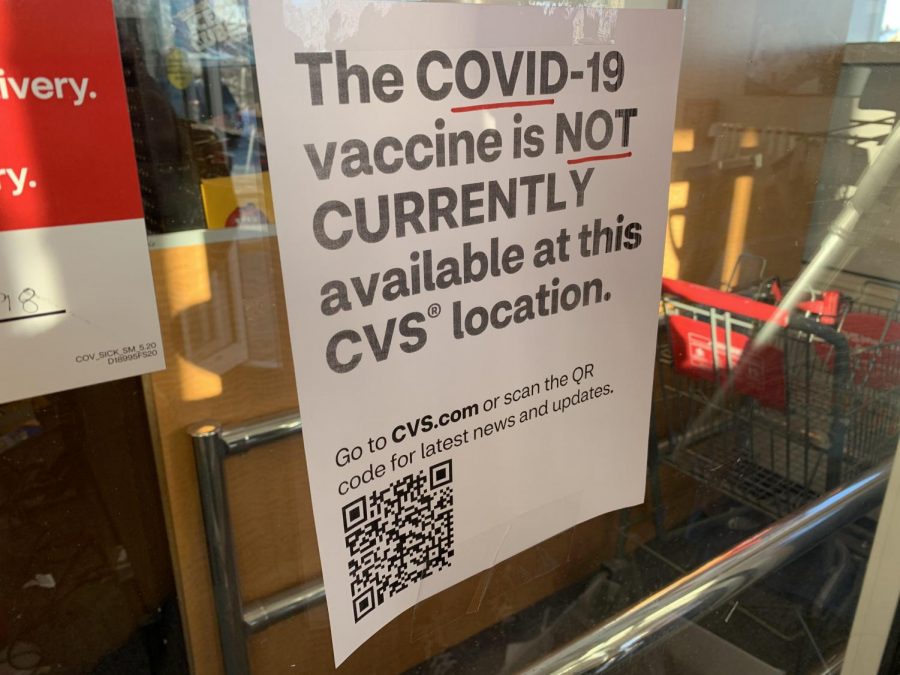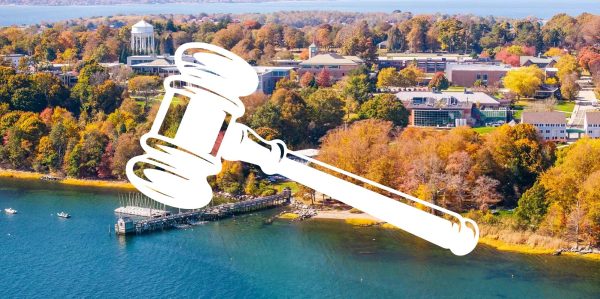As COVID-19 vaccine rollout progresses, some students will get vaccinated earlier than others
Emily Dvareckas / The Hawks’ Herald
Two CVS vaccination sites have opened in Rhode Island so far, but no COVID-19 vaccines are available yet in this location at 10 Turnpike Ave. in Portsmouth.
The distribution of COVID vaccines has started for the older population in America. RWU senior Lea Peterson moved from the end of the line to get a COVID-19 vaccine to the front because she is working as an Emergency Medical Technician at the Bristol Fire Department and for a private ambulance service.
She received her first dose of the Moderna vaccine on Dec. 19, 2020, at Bristol’s Quinta-Gamelin Community Center, at the entrance to Colt State Park, and returned there for the second dose on Jan. 27. The shots, which must be given at least 28 days apart, were found to be 94.1% effective at preventing people from catching COVID-19.
“I feel very grateful, fortunate and hopeful for our future,” Peterson said in an email. “The only shot we have as a society of going back to a version of our ‘normal’ is trusting in science and experts, as well as getting vaccinated when the opportunity arises.”
But most RWU students will have to wait at least a couple of months or longer. This is because the distribution of the vaccine is being done in phases, and there is currently not high enough supply for the vast amount of people who need it. Only two vaccines have been approved here in the U.S., although more are in the pipeline.
In Rhode Island and elsewhere, healthcare workers and others on the front line have been the first to receive the vaccine in December, January and February. According to Gov. Raimondo, Rhode Island has administered nearly 130,000 doses of the vaccine as of Feb. 10. Under the state’s phased rollout, people 75 years and older became eligible this month, which will be followed by people ages 65-74 later in the month, people 60 to 64 (as well as those 16 to 64 with underlying health conditions) in March, 50-59 in April, 40-49 in late May and 16-39 in July.
Vice President of Student Life John King recently attended a Student Senate meeting, wherein he said the university applied to become a vaccine distribution center. When reached for comment, he said it was premature to talk about that possibility given the state’s evolving distribution plan and supply chain issues.
“There simply is not currently enough information about the availability of vaccines to project whether or not the university will have the opportunity to serve as a vaccination center for our campus community later in the semester,” King added. “That said, the university will eventually require evidence of COVID-19 vaccination for enrolling students and employees once there is mainstream availability. It is still too early in the vaccination process to project if that requirement will be in place for the start of the next semester. The university is willing and able to be a point of distribution for vaccinations if supply allows and we are asked by the state to provide that service.”
As with any vaccine, the COVID vaccine has been known to come with side effects. Peterson, for example, said she and others she worked with experienced flu-like symptoms for 12 to 48 hours. Nonetheless, people she knows are glad she got vaccinated.
“Most people are happy to know that I am vaccinated and hopeful to get vaccinated themselves,” Peterson said.
In addition to Moderna, another US-approved vaccine has been created by Pfizer. Both were developed using messenger RNA technology that has existed for over a decade. Both are also inactivated vaccines, meaning they are not made using the live virus.
Since the virus was sequenced in Jan. 2020, clinical trials were able to start quickly in mid-March, as part of a project created by the Department of Health and Human Services. The goal of this project, known as “Operation Warp Speed,” was to develop 300 million doses of COVID vaccines by January 2021. Tens of thousands of people participated in clinical trials, in which it was found that the Moderna vaccine was 94.1% effective and the Pfizer vaccine was 95% effective.
An ever-important piece of discourse concerning the COVID vaccines has been the hesitancy many people have felt about getting it. These anxieties range from those concerning the vaccines’ efficacy to fears they may have been rushed into production. The best thing for people to do with regards to this is to keep informed via reliable sources and decide for themselves whether to get the vaccine or not.
College opinion polling platform College Pulse conducted a survey on Jan. 27, asking 1,000 college students whether or not they believe colleges can make their students get vaccinated before returning to campus. 71% agreed, 19% disagreed and 10% said they weren’t sure. Here at RWU, students have been required to fill out a COVID-19 Student Community Pledge in order to return to campus, as well as take two clearance tests and test negative for both before beginning regular testing.






